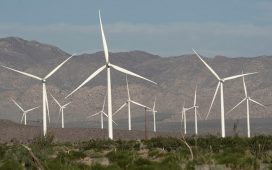With help from Gavin Bade, Kelsey Tamborrino, Josh Siegel and Catherine Morehouse
Editor’s note: Morning Energy is a free version of POLITICO Pro Energy’s morning newsletter, which is delivered to our subscribers each morning at 6 a.m. The POLITICO Pro platform combines the news you need with tools you can use to take action on the day’s biggest stories. Act on the news with POLITICO Pro.
— Alberta’s premier traveled to Washington to pitch the province’s oil, just as the administration warms toward Caracas.
— The House Water Resources Development Act is up for a committee vote today, offering another opportunity for major bipartisan climate and environment legislation.
— EPA Administrator Michael Regan is back on the Hill today to talk about his agency’s budget request.
HAPPY WEDNESDAY! I’m your host, Matthew Choi. Congrats to Michael Karlovich of PBF Energy for knowing Doug Dimmadome is the owner of the Dimmsdale Dimmadome. For today’s trivia: Who sang the “Ratatouille” song (you know what I’m talking about)? Send your tips and trivia answers to [email protected]. Find me on Twitter @matthewchoi2018.
Check out the POLITICO Energy podcast — all the energy and environmental politics and policy news you need to start your day, in just five minutes. Listen and subscribe for free at politico.com/energy-podcast. On today’s episode: How Russia’s invasion of Ukraine is hurting the Glasgow climate deal.
CANADA VS VENEZUELA? More than two months after President Joe Biden announced a ban on Russian oil imports, Washington continues to wring its many hands over where to find some alternatives.
The Biden administration loosened up some of the punitive measures on President Nicolas Maduro’s regime in Venezuela, including allowing Chevron to negotiate the terms of “potential future activities” in the country, two senior U.S. officials told the AP on Tuesday. While the moves don’t allow Chevron to drill or sell any Venezuelan oil — or enable state-owned PDVSA to enter agreements with U.S. firms or trade on U.S. markets — it won’t go over well with Republicans or other fossil-friendly lawmakers.
GOP lawmakers and Senate Energy Chair Joe Manchin blasted the administration after it sent representatives to Caracas in March to negotiate energy issues (among other priorities). They reiterated the point Tuesday during a hearing on the Canadian-U.S. energy relationship, where Alberta’s Premier Jason Kenney pitched his province’s oil sands as a replacement for Russian oil.
Kenney said the canceled Keystone XL pipeline would have provided more than enough Canadian oil to replace Russian imports and that “we find it inexplicable that the government of the United States has been more focused on encouraging additional OPEC production than Canadian production.”
Still, even if Biden had not blocked the permit for the pipeline, it still would not have been in operation in time to help offset Russia oil shipments to the U.S. But Kenney stressed Canada’s bitumen was a better alternative than Venezuelan oil, citing his country’s far more stringent environmental standards in his country.
Manchin likewise emphasized the importance of U.S.-Canada energy exchanges, though he didn’t appear keen on diving back into the Keystone XL issue, saying Tuesday’s hearing was not meant to “relitigate the past.”
Lawmakers on the committee were eager to learn more about Canada’s considerably faster permitting process. The Biden administration is revamping former President Donald Trump’s changes to NEPA, and both Republicans and some clean energy backers are hoping to keep guidelines that to cap permitting processes to under two years.
SEE YOU AT THE SUMMIT: POLITICO is convening its second Sustainability Summit today at Hotel Washington. We’ve got a great line up, including Granholm; Reps. Sean Casten, Nancy Mace and Raul Grijalva; Sen. Debbie Stabenow; Washington Gov. Jay Inslee; and so many more! Tune in here at 10 a.m.
WRDA WEDNESDAY: The House Transportation and Infrastructure Committee votes on its version of the 2022 Water Resources Development Act today. The Senate Environment and Public Works Committee unanimously advanced its bill containing the massive water projects legislation two weeks ago, presenting it as a major bipartisan win on both infrastructure and the environment.
The House version includes feasibility studies for a larger number of U.S. Army Corps of Engineers projects, but does not include the creation of new environmental justice advisory bodies for the Corps, opting instead to mandate direct outreach programs. For a refresher on the differences between the two packages, your host has you covered.
BIPARTISAN ENERGY GANG RIDES AGAIN: The group of senators chasing a bipartisan energy and climate change deal held another meeting Tuesday night, their fourth since discussions started a few weeks ago. Manchin, who is leading the group with Sen. Lisa Murkowski (R-Alaska), claimed “good progress” to assembled reporters but was otherwise mum.
It still appears to ME that senators are feeling out different ideas, without a real breakthrough that would suggest a deal is close. Previous meetings focused on getting a grasp on the clean energy tax credits that Democrats already passed in the House as part of the reconciliation package that Manchin opposed.
THE BUDGET BASH: EPA Administrator Michael Regan is back on the Hill today to discuss his agency’s budget request for fiscal year 2023. He’ll go before the House Appropriations Interior, Environment and Related Agencies Subcommittee after testifying for the House Energy and Commerce Committee on Tuesday, where he pressed for more funding to address climate change as the clock ticks on mitigating emissions and keeping global warming in check, and to right environmental injustices.
Republicans, however, appeared unimpressed, with Environment and Climate Change Subcommittee Republican Leader David McKinley saying: “You seem to want to fund more climate change and environmental justice programs, neither of which will lead to grid [reliability], only blackouts across the nation.”
Across the Rotunda,Senate EPW digs into U.S. Fish and Wildlife Service’s fiscal 2023 budget proposal with FWS Director Martha Williams. It’s her first time back before the committee since her confirmation earlier this year, and Chair Tom Carper plans to focus on climate change’s impacts on biodiversity loss and habitat decline, according to his aide.
The Senate Appropriations Energy and Water Development Subcommittee has a hearing today on the National Nuclear Security Administration’s FY 2023 budget request. The NNSA’s budget request will also go under the microscope in the Senate Armed Services Committee on Thursday, where Granholm will testify.
Finally, the House Select Committee on the Climate Crisis has a hearing today on building a climate resilient food supply chain.
ME FIRST: GOP PRESS RAIMONDO TO FIX OFFSHORE PERMITS: Several top Senate Republicans are asking Commerce Secretary Gina Raimondo to expedite permitting for offshore oil and gas leases that were delayed due to miscalculations on environmental impacts. The letters of authorization would be for geological exploration on existing leases in the Gulf of Mexico and have been backlogged at Commerce’s National Marine Fisheries Service, some for over 100 days, the lawmakers wrote in a letter to Raimondo sent Tuesday evening and shared exclusively with ME.
“NMFS’ permitting delays represent one example of the Administration’s de facto ban on new drilling — impeding domestic oil and gas investment, exploration and production,” the senators, led by Sen. Ted Cruz (R-Tex.) wrote. Other signatories include Energy Committee ranking member John Barrasso, Environment and Public Works ranking member Shelley Moore Capito and several other prominent energy Republicans.
SOLAR PROBE PRESSURE: More than 80 House Democrats urged an expedited preliminary determination in the Commerce Department’s probe into solar components from Southeast Asia. In a letter to Biden — led by Democratic Reps. Raja Krishnamoorthi (Ill.), Scott Peters (Calif.) and Kathy Castor (Fla.) — the lawmakers ask that the determination “take into account the larger ramifications for the U.S. economy and the global fight against climate change, in so far as is possible under the law.” Raimondo pledged to move as fast as possible under the statute, but has disputed that the department could consider climate change impacts or supply chain constraints in its determination.
The letter has prompted its own opposition from the United Steelworkers, which separately wrote to House lawmakers with concerns that some “are distorting” how the investigation process works. The letter defends the process for anti-dumping and countervailing duties and says it should exclude any political interference. “It is irresponsible and threatens every industry and worker who relies on AD/CVD laws to help level the playing field,” the letter said.
Krishnamoorthi told ME he respected the union’s point of view, adding that he too believes there should not be any political interference in the inquiries. But he added that Commerce needs to be “expeditious” and take into account the different factors.
IN THE CHINA CONFERENCE TOO: The tension between labor and the solar industry is also playing out in the China bill conference. SEIA sent a letter to conferees on Monday urging them to alter language in the House version of the legislation to give the Commerce secretary more authority to throw out petitions for anti-circumvention investigations. The group is concerned that the House version would “improperly discard” the secretary’s authority to reject the petitions, even before opening an investigation.
“In effect, Commerce concluded that it was required to proceed with an investigation even when a petition is based on frivolous claims,” wrote SEIA. “This is a dangerous and short-sighted application of U.S. law.” To fix that, SEIA wants lawmakers to insert a so-called “public interest” provision in the legislation that would allow the secretary to throw out petitions if the agency finds that they are not in the public interest.
Expect the provision to be hotly contested by organized labor and its allied lawmakers, who will argue that the language would fundamentally weaken American trade law by allowing the secretary – a political appointee – to overrule what they see as a technocratic process.
“WHAT THE FERC!”: The energy regulator is at the center of a new political advertising campaign launched by conservative advocacy group Common Sense Leadership Fund, primarily targeting voters in Nevada and New Hampshire. The regulatory agency is being used as fodder for the broader argument that Democratic policies are driving high gas prices, and the ads target incumbent Sens. Catherine Cortez Masto, (D-Nev.), and Maggie Hassan, (D-N.H.), who are both up for reelection this year.
“What the FERC! Biden’s Democrats are intentionally raising your high energy prices,” reads one ad, aimed at a national audience. “Tell Maggie Hassan to stand the FERC up for New Hampshire,” another state ad reads. Nevada is considered a toss-up state, according to a POLITICO forecast, and Cortez Masto faces a “brutal” political environment. Hassan is considered likely to keep her seat in New Hampshire, though POLITICO predicts it could be “much more competitive” than the 2020 election, which saw Biden take the state by 7 points.
TEXAS GRID OFFICIALS: NO THREAT TO POWER THIS SUMMER: Texas grid officials characterized last week’s event that tripped six power generators offline and forced the grid operator to call for conservation across the state last weekend as proof that legislative reforms intended to improve grid reliability are working as intended, and insist there will be no mass outages this summer.
“I know the lights are going to stay on because of all the reforms we put in place,” said Public Utilities Commission of Texas Chair Peter Lake, on a call with reporters Tuesday. “And because when we do encounter challenges, like we saw last weekend, the multiple reforms are complementary and build off of each other to create even greater reliability.”
ERCOT on Friday asked Texans to keep their thermostats at 78 or higher and avoid using large appliances through Sunday in order to lower demand as the grid operator scrambled to maintain reliability during a heat wave that sent temperatures to nearly 100 degrees. Several reporters questioned whether such an event so early in the year was an ominous sign ahead of hotter summer months where stakes will be much higher. But ERCOT and its regulator insisted the grid will be prepared. “We’re going to get through this summer,” said Lake. “We’re better prepared than we ever have been before.”
— ”U.S. Floats Tariff on Russian Oil as EU Oil-Sanction Talks Drag On,” via The Wall Street Journal.
— “Oil falls 2% on Powell comments, hopes for Venezuela supply,” via Reuters.
— “Court won’t reconsider Baltimore climate suit ruling, teeing up SCOTUS appeal,” via POLITICO.
— ”In Australia’s quiet climate election, independents could make noise,” via The Washington Post.
THAT’S ALL FOR ME!









